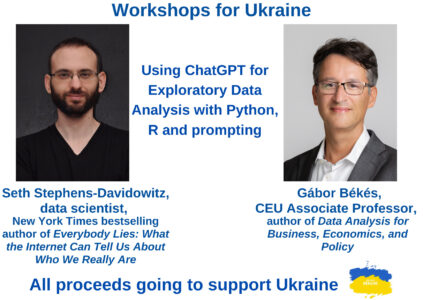Join our workshop on Using ChatGPT for Exploratory Data Analysis with Python, R and prompting, which is a part of our workshops for Ukraine series!

Here’s some more info:
Title:Using ChatGPT for Exploratory Data Analysis with Python, R and prompting
Date: Thursday, November 30th, 18:00 – 20:00 CET (Rome, Berlin, Paris timezone)
Speakers: Gábor Békés is an Associate Professor at the Department of Economics and Business of Central European University, a research fellow at KRTK in Hungary, and a research affiliate at CEPR. His research is focused on international economics; economic geography and applied IO, and was published among others by the Global Strategy Journal, Journal of International Economics, Regional Science and Urban Economics or Economic Policy and have authored commentary on VOXEU.org. His comprehensive textbook, Data Analysis for Business, Economics, and Policy with Gábor Kézdi was publsihed by Cambridge University Press in 2021.
Seth Stephens-Davidowitz is a data scientist and New York Times bestselling author. His 2017 book, Everybody Lies, on the secrets revealed in internet data, was a New York Times bestseller; a PBS NewsHour Book of the Year; and an Economist Book of the Year. His 2022 book, Don’t Trust Your Gut, on how people can use data to best achieve their life goals, was excerpted in the New York Times, the Atlantic, and Wired. Seth has worked as a data scientist at Google; a visiting lecturer at the Wharton School of the University of Pennsylvania; and a contributing op-ed writer for the New York Times. Seth has consulted for top companies. He received his BA in philosophy, Phi Beta Kappa, from Stanford, and his PhD in economics from Harvard.
Description: How can GenAI, like ChatGPT augment and speed up data exploration? Is it true that we no longer need coding skills? Or, instead, does ChatGPT hallucinate too much to be taken seriously? I will do a workshop with live prompting and coding to investigate. I will experiment with two datasets shared ahead of the workshop. The first comes from my Data Analysis textbook and is about football managers. Here I’ll see how close working with AI will get to what we have in the textbook, and compare codes written by us vs the machine. Second, I’ll work with a dataset I have no/little experience with and see how far it takes me. In this case, we will look at descriptive statistics, make graphs and tables, and work to improve a textual variable. It will generate code and reports, and I’ll then check them on my laptop to see if they work. The process starts with Python but then I’ll proceed with R.
Seth Stephens-Davidowitz is writing a book in 30 days using ChatGPT’s Data Analysis. The book is called Who Makes the NBA? and is a statistical analysis of what it takes to reach the top of basketball. Seth will illustrate his experience with one of the case studies he had worked on. The Workshop will end with Seth and Gabor chatting about their experiences in what works well
Minimal registration fee: 20 euro (or 20 USD or 800 UAH)
How can I register?
- Go to https://bit.ly/3wvwMA6 or https://bit.ly/3PFxtNA and donate at least 20 euro. Feel free to donate more if you can, all proceeds go directly to support Ukraine.
- Save your donation receipt (after the donation is processed, there is an option to enter your email address on the website to which the donation receipt is sent)
- Fill in the registration form, attaching a screenshot of a donation receipt (please attach the screenshot of the donation receipt that was emailed to you rather than the page you see after donation).
If you are not personally interested in attending, you can also contribute by sponsoring a participation of a student, who will then be able to participate for free. If you choose to sponsor a student, all proceeds will also go directly to organisations working in Ukraine. You can either sponsor a particular student or you can leave it up to us so that we can allocate the sponsored place to students who have signed up for the waiting list.
How can I sponsor a student?
- Go to https://bit.ly/3wvwMA6 or https://bit.ly/3PFxtNA and donate at least 20 euro (or 17 GBP or 20 USD or 800 UAH). Feel free to donate more if you can, all proceeds go to support Ukraine!
- Save your donation receipt (after the donation is processed, there is an option to enter your email address on the website to which the donation receipt is sent)
- Fill in the sponsorship form, attaching the screenshot of the donation receipt (please attach the screenshot of the donation receipt that was emailed to you rather than the page you see after the donation). You can indicate whether you want to sponsor a particular student or we can allocate this spot ourselves to the students from the waiting list. You can also indicate whether you prefer us to prioritize students from developing countries when assigning place(s) that you sponsored.
If you are a university student and cannot afford the registration fee, you can also sign up for the waiting list here. (Note that you are not guaranteed to participate by signing up for the waiting list).
You can also find more information about this workshop series, a schedule of our future workshops as well as a list of our past workshops which you can get the recordings & materials here.
Looking forward to seeing you during the workshop!